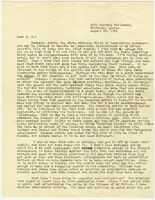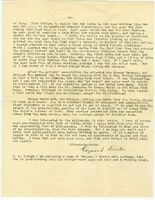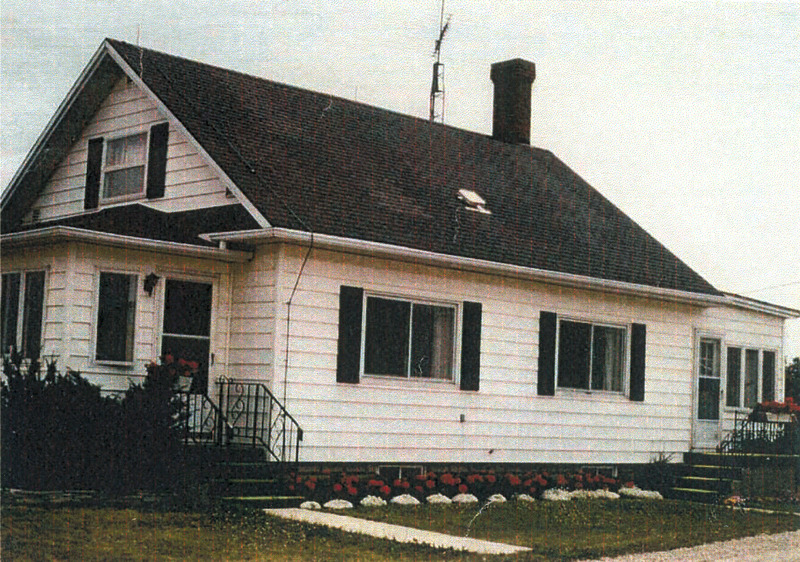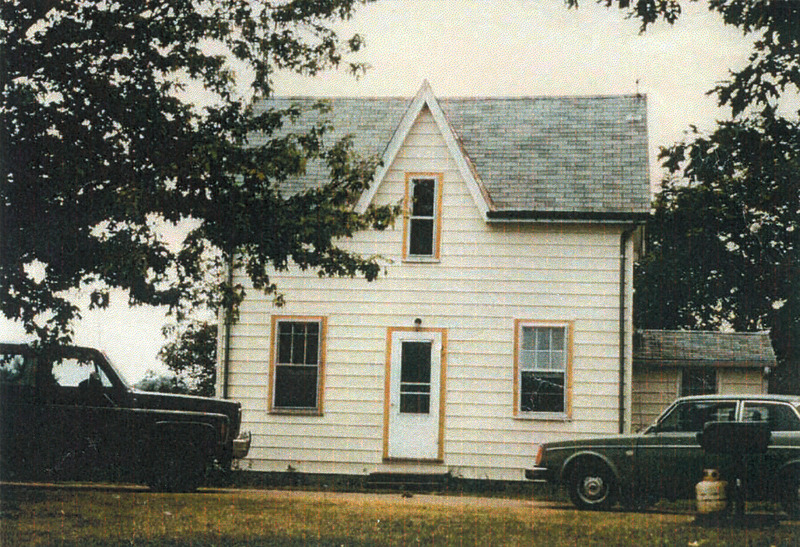E.F.
Transcript and original typsecript of letter to E.F.
Page 1 of original typescript of letter to E.F. written by Raymond Knister.
Page 2 of original typescript of letter to E.F. written by Raymond Knister.
4390 Decarie Boulevard,
Montreal, Quebec
August 28, 1931
Dear E. F.:
Perhaps, noting the above address, which is temporarily permanent, you may be induced to ascribe my unmannerly dilatoriness to my rather eventful life of late; but the chief reason, I find that my esteem for you is so high that I do not like to put you off with the hasty inanities which serve as correspondence with some of my friends. (I’m trying another novel, but it won’t have many readers if all the sentences are as long as that!) Then I know that your ideals for authors are high (though you have seen them munch cake and gulp tea while declaiming their verses). It is good to know that there are a few people left like you. Most have no interest in things of the spirit, and most of those who have fancy themselves embryo Shakespeares. Between the two, what is a plain hard-working author? Solely, I suppose, for that satisfaction of having made something, at which the ignorant may gape (“Always scribble, scribble, eh M. Voltaire,” said the Queen) and the semi-ignorant fancy they could easily equal, while the few who can appreciate technical excellence are sure they can surpass it. The sense of accomplishment is a great deal, even while the world rewards the accomplishment precisely as much as though the artist has been whittling stove wood into knitting-needles. There could not be a truer saying tha[n] that applied by the Canadian author to himself: he should make his living in another way, and make his art a social accomplishment and matter for tea-table conversation. The Canadian artist is much better off. He is liberated by the fact that only a very few can possibly appreciate or criticize his technique, and he can let the gapers go [elsewhere]. That is why we have a national school of painting which commands the respect of painters in other countries, now. What about out much-praised poets? Thirty or forty years ago English or American critics spoke patronizing words of praise, on which “Canadian Poetry” is still living, Why have we no school of the Canadian noel, as small countries like Denmark and Sweden and Norway have? known the world over for its indigenous excellence? Because nobody has cared for the kind of life we lived in Canada, but always wanted it to be and seem different.
I should make this into an article, and get it off my chest thoroughly, and also get some money for it. I don’t feel strongly enough about it, I am just depressed, just conscious enough in the drugged atmosphere to rebel faintly against the fate that has overtaken all our writers and used to overtake practically all American writers when they got just so far, and then slackened, retrograded; sat back as established writers on whom no more demands were to be made except repetition. Alas, it is still worse in Canada, for the public does not even pay the writer enough to make him a respected person in his community. William Dean Howells and James Lane Allen lived as prettily as corporation lawyers or country gentlemen and some respect was shown for what they were doing.
What have I been doing to engender such reflections? Not working; that might at least keep me from expressing them. Since I was called home in April just after winning the prize by the illness of my father, I have written practically nothing. The sale and settling up ended about the end of June. Poor Father, he really had bad luck; he had been working like two men for years to re-establish himself financially, and the goal was just coming into view when he died. Last year, which was bad for most farmers, he made good by adapting a crop which few others knew about, and making a market for it—soy beans… I drove the cattle to the station at Northwood one day and the next drove to Port Dover and Toronto, picking up Myrtle. Arrived one hour late for that night’s banquet, on account of daylight saving. I seemed somehow to rest under a cloud among my minor Toronto confreres, which I learned was to be explained (aside from the fact that they had entered the Graphic Contest and lost) by the assiduously fostered rumour that the Graphic Publishers had failed. However, the third prize had been paid, and part of the second before that time; and since then I have got a little of mine. No doubt they will weather the storm, and I shall too. If I can’t write the next book free of money worries, perhaps I can the one after that. But if I had known of this I would stayed where living was cheaper.
After the Authors’ Association (we attended one dreary banquet, but skipped the Annual one to spend the evening with Mr. & Mrs. Morley Callaghan) we took a trip up to Timmins, 600 miles from Port Dover. It was interesting, buy I can not understand the people who “go bushy” and never want to return to civilization (?) On our return we packed up and moved down here. Would like to take a trip down the St. Lawrence to Gaspe, which is 600 miles from here. However, Montreal is interesting for the time being. We have leased a flat until May (there are no houses, except for millionaires).
Imogen walks now, but without lifting her hands from the floor, unless to hold on a chair. She is a constant source of amusement and exasperation. Great diplomacy is required to get her to eat or sleep. It is easy to see the origin of the side-to-side gesture of the head to signify no—it comes from the child’s refusal of food. Many another intimation from our ancestors comes from the same source, were one learned enough to decipher them.
I was interested by the philosophy in your letter. I have of course been pre-occupied with that of Keats, which I agree with Middleton Murry was approaching that of Shakespeare. I will be interested in what you think of my interpretation, when the book appears. But I do hope you won’t wait until that problematical date before writing me again. It is a matter of regret to both of us that we did not have an opportunity of seeing you this Spring. I hope that you have been well, and that your mother is still hale and hearty.
Sincerely yours,
[Handwritten signature: Raymond Knister]
P. S. Though I am enclosing a snap of Imogen, I should add, perhaps, that she is good-looking like her mother—dark eyes and hair and a winning laugh.




